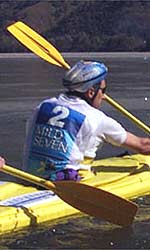|
|
| ||||||||||||||||||||||||||
Mild Seven Outdoor Quest: Lijiang, China 02 NOV 2000
After more than 10 hours of racing,
only two seconds separated Team Beaver Creek and defending champions
Team Nokia at the conclusion of the 2000 Mild Seven Outdoor Quest's
first day of racing. With thousands of colorfully bedecked local
residents cheering them on, the Americans of Beaver Creek found the
energy to sprint past the Finns of Nokia.
"With three more hard days to go, I definitely could have done without that sprint finish," groaned Beaver Creek's Mike Pigg, collapsing to the ground after his team nipped Nokia at the tape. "But that's the way racing works. You get caught up in the moment and do what has to be done to cross the finish line first." A few feet away, the exhausted members of Team Nokia Adventure struggled to find the perfect words to describe the day's final event: twelve brutal uphill kilometers of trail running. "Steep," was the best Team Captain Petri Forsman could do, shaking his head at the memory. "Steep." Team Beaver Creek crossed the finish line in 10:06:45. Nokia Adventure was two seconds back. Team Mild Seven, the plucky Chinese squad, was ninth in 10:51:16. Now in its fourth year, the Mild Seven Outdoor Quest is known internationally as the premier multisport endurance race. Olympians, world champions, Ironman champs — they all come to China once a year to push their mental, physical and emotional limits. French twins sisters Beatrice and Isabelle Mouthon, fresh off competition in the 2000 Olympic triathlon, are just two of the many Olympians present. Fittingly, the Mouthons are keeping their competitive edge sharp by competing on separate teams.
Like the Tour de France, MSOQ is a stage race. Four-person teams, each
having at least one member of the opposite gender, contest four days of
mountain biking, trail running, kayaking, inline skating, mountain bike
biathlon, lake paddling, and adventure skills. The team with the lowest
elapsed time is declared the winner. At $200,000 (US) the MSOQ purse is
the largest in multisports.
With every passing year, MSOQ competition has become harder. This prompted Race Director Murphy Reinschreiber to make the 2000 MSOQ the toughest ever. Adventure racing world champion Ian Adamson was brought in to design a course from the athlete's point of view — one that would force them to go at top speed always, without being so daunting that competitors were physically unable to meet the challenge. Adamson succeeded wildly. The first stage of the 2000 MSOQ was a scant 75 kilometers long, but Lijiang's mountainous terrain and altitude made for a very long day of racing. The top-10 teams remained within seconds of each other throughout much of their long day under clear blue skies and puffy white clouds. Beginning with a run through Lijiang's Old Town, the athletes biked, paddled the Yangtze River to legendary Tiger Leaping Gorge, mountain biked once more, then ran again. The pace was furious. "The lead changed hands three or four times," Pigg noted. "We didn't take the lead for good until crossing the finish line." Through much of the day it looked as if Team Australia Beef, led by eight-time Hawaiian Ironman champion Paula Newby-Fraser, had a lock on first place. Cycling and paddling with efficiency, their peak fitness staked them to a two-minute lead going into the final uphill run. But team member Novak Thompson was utterly exhausted — "bonked" in endurance racing parlance — and Team Australian Beef saw firsthand how tentative an MSOQ lead can be. As Thompson struggled up the steep trail, Team Australia Beef was passed by Beaver Creek, Nokia Adventure and French squad Team Eads Bo Number 2. Australia Beef finished the day fourth, 10 minutes behind the leaders. "It's not a problem," Newby-Fraser noted positively. "He'll be fine tomorrow, and we'll be ready to race hard again." If Thompson needs any motivation, he needs to look no further than Team Eco-Internet's Danelle Ballengee. The 29-year old American broke her wrist three weeks ago. Doctors told her not to pursue physical activity for at least eight weeks. Yet, as MSOQ competitors race down the broad Yangtze in their bold yellow kayaks, Ballengee — wrist encased in a cast — was giving it her all. Not only did she complete the kayak section, but Eco-Internet finished the day in sixth place. Stage Two doesn't promise much chance for Ballangee or Thompson to lick their wounds. The second day of competition will be short — but extremely fast. The athletes will contest every MSOQ discipline, likely finishing in a little over three hours. Ten teams are within striking distance of first place, meaning none can afford to race below their optimal level. However, this presents a dilemma: teams must race hard to remain among the leaders, but they must also conserve a modicum of energy because Stage Three is expected to be another long day or racing. Adamson admits that the first team will finish in "at least nine hours." Teams say they're already strategizing and finding ways to save energy for the arduous days ahead. "That's where that sprint finish today could come back to hurt us," Beaver Creek's Pigg explained. "In an event as long as MSOQ, every little bit of energy is vital." And with that, Pigg climbed to his feet and limped off to discuss strategy with his teammates — and with members of other teams. MSOQ's competitors are members of an international brotherhood of extreme endurance athletes. "Today was a fantastic day of racing," exulted Beatrice Mouthon, whose team finished 45 minutes ahead of her twin sister's. "Tomorrow will be even better."
—Courtesy Mild Seven Outdoor Quest SEE ALSO: The A-Files | Start to Finish Index
|
|
|||||||||||||||||||||||||


